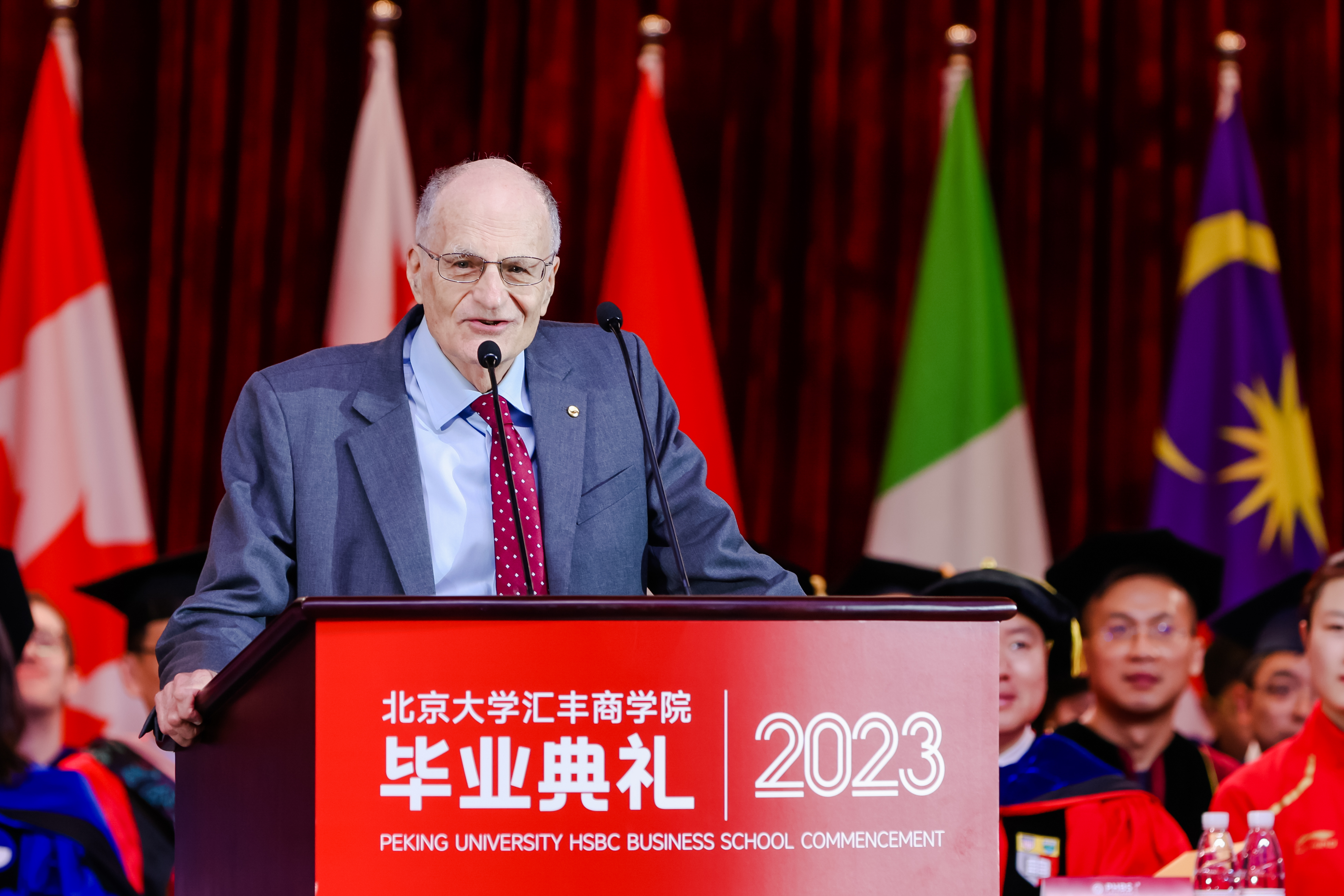托马斯·萨金特:我努力铭记的10条经济学启示丨北大汇丰2023年毕业典礼
2023-06-06 09:26:57
6月3日,北京大学汇丰商学院2023年毕业典礼隆重举行。教师代表,2011年诺贝尔经济学奖得主,北大汇丰萨金特数量经济与金融研究所荣誉所长、高级顾问托马斯·萨金特(Thomas J. Sargent)在发言中介绍了自己总结的10条经济学启示。发言以英文进行,以下为中文译文和英文原文。

我们一起学习了如何用统计学和经济学描述和解读大大小小的数据。
我们运用数学保障模型的内部一致性。
我们希望运用这些工具来改善我们的家庭及社群的生活。
以下是我努力铭记的10条经济学启示。
1. 由于市场价格汇集了其他人群的信息,所以股票价格、利率和汇率难以被预测。
2. 许多合意的事物未必可行。
3. 个体和社群都面临着权衡取舍,有些取舍介乎平等和效率之间。
4. 他人比你更了解他们自己的能力、付出和偏好。
5. 每个人都会对激励做出反应,包括你想帮助的人,这就是为什么社会保障体系有时并不能如预期那样发挥作用。
6. 在社会均衡中,人们满足于各自的选择,因此改善现有安排和结果的尝试可能充满挑战。
7. 一代人可以将成本转移到下一代人身上,这正是国债和美国社会保障体系所正在做的事(而新加坡社会保障体系并非如此)。
8. 民众终将为政府的开支买单,今天亦或明天,通过显性的税收亦或隐性的通胀。
9. 绝大多数人都希望其他人为公共品和政府转移支付(尤其让他们自己受益的转移支付)买单。
10. 未来,你们也将对激励做出反应。有些承诺是你们乐意但却不应做出的。没有人会相信那些承诺,因为他们知道,日后遵守那些诺言对你们并没有好处。此处的教训是:每当你做出承诺前,思考一个问题:如果情况发生改变,你是否还会信守诺言?如此,你才能够赢得一个好名声。
Together we have learned about how to use statistics and economics to describe and interpret data, big and little.
We use mathematics to assure ourselves that our models are internally consistent.
We use statistics to investigate whether our models are consistent with data.
We want to use these tools to improve the lives of our families and communities.
Here is a list of economics lessons I try to remember.
1. Because market prices aggregate other peoples’ information, it is difficult to forecast stock prices and interest rates and exchange rates.
2. Many things that are desirable are not feasible.
3. Individuals and communities face trade-offs, some of them being between equality and efficiency.
4. Other people have more information about their abilities, their efforts, and their preferences than you do.
5. Everyone responds to incentives, including people you want to help. That is why social safety nets sometimes don’t work as intended.
6. In a social equilibrium, people are satisfied with their choices. That is why it can be challenging to improve arrangements and outcomes.
7. It is feasible for one generation to shift costs to subsequent ones. That is what national government debts and the U.S. social security system do (but not the social security system of Singapore).
8. When a government spends, its citizens eventually pay, either today or tomorrow, either through explicit taxes or implicit ones like inflation.
9. Most people want other people to pay for public goods and government transfers (especially transfers to themselves).
10. In the future, you too will respond to incentives. There are some promises that you’d like to make but should not. No one will believe those promises because they know that later it will not be in your interest to keep those promises. A lesson here is this: before you make a promise, think about whether you will want to keep it if and when your circumstances change. This is how you can earn a good reputation.
来源:公关媒体办公室
翻译:赵玉茹、安妮、蒋果
编辑:木南、姜岸









